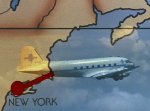The math on group checks can get a little odd though if you don't adjust the DCs downward when more characters are involved in the check. For the sake of simplicity, let's say the average bonus for the PCs is 0, the DC for the task is 15:
Two characters (one doing the task with the other taking the Help action) has a 51% chance of success.
Now if we go with 3 PCs and a group check where 2 or more must succeed, the odds of success drop significantly to 22%.
If we go with 4 PCs (2 must succeed), the odds are a more favorable 35%, but still not as good as one character with one helping.
For 5 PCs where three must succeed, the odds are only 17%.
Players that know the math (and have an odd-numbered party) might just try to avoid making group checks like the plague which I'm sure was not the intent of the mechanic. Because I always have four players, my general rule of thumb is to drop the DC by 5 for a group check of 3 to 4 and rule that a fifth person (like an NPC) isn't of any help and possibly represents that one too many cooks spoiling the broth.
This dovetails rather nicely with my posts on the other thread about objective vs subjective DCs. I haven't done an extensive analysis to establish a baseline competency across a spectrum of builds across levels. However, my guess is that if you were going to establish a subjective DC framework for 5e (roughly representing 4e, 13th Age, and DW), I'd probably go something like this:
[TABLE="width: 500"] [TR] [TD]Level/Difficulty[/TD] [TD]Easy[/TD] [TD]Medium[/TD] [TD]Hard[/TD] [/TR] [TR] [TD]1-4[/TD] [TD]8[/TD] [TD]12[/TD] [TD]16[/TD] [/TR] [TR] [TD]5-12[/TD] [TD]9[/TD] [TD]13[/TD] [TD]18[/TD] [/TR] [TR] [TD]13-20[/TD] [TD]10[/TD] [TD]15[/TD] [TD]20[/TD] [/TR] [/TABLE]
I rather like the paradigm of:
Trained/Prof + PAS (primary ability score) = ~ auto-success on E, ~ 80 % success on M, ~ 60 % success on H
UT/N-prof + SAS (secondary) or T/P + TAS = ~ auto-success on E, ~ 45 % success on M, ~ 25 % success on H
That would aid in the Group Check math problem you're referring to, especially if you allow secondary members accept an auto-failure on their effort to use the Help action.
As a quick aside, when I was running one-offs for the playtest packets and for the evening one-off that I ran (which basically mocked the prior session of a current game with a different system), I ran the unified conflict resolution system I devised for 13th Age (and used the 1-4 numbers above as subjective DCs). Its pretty simple and handles dramatic momentum rather well. It was used for a travel scenario like the player in the lead post is looking for. It was akin to a Deuce game in Tennis:
Campaign Win <
Disadvantage <
Square One >
Advantage >
Campaign Loss
It works to keep the situation in the most dramatic areas (cusp of victory, edge of defeat) with the most interesting outcomes for as long as possible until the conflict is cemented either way. 5e's disad/ad mechanic works well to support that.



